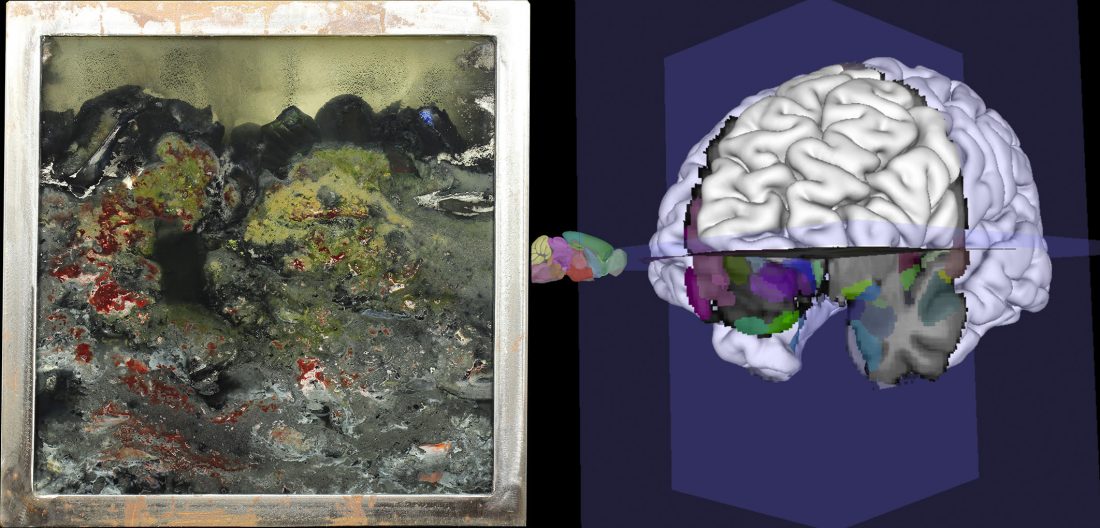Arts and Performance
The Bio-Art Mixer # 9 Online symposium
August 16, 2020 at 6:30pm – 9:30pm EDT
Shaffer Art Building
This event has already occurred. The information may no longer be valid.

We are happy to announce our Bio-Art Mixer Online Symposium on August 20th. This is our second part of the two-day symposium in which we host seven talks by artists and scientists, who will share their research and will follow with Q&A.
August 20th presentations:
Matej Vakula, Ph. D. candidate in Electronic Arts, Rensselaer, Troy, NY
Jenifer Wightman, Cornell University, Dept of Crop and Soil Science
Mayra Cadorin Vidal, Ph. D., Post-doctoral researcher at Syracuse University
6.30 pm, August 20th
Zoom link: https://syracuseuniversity.zoom.us/j/96060401646
Zoom ID: 960 6040 1646
Matej Vakula
Ph. D. candidate in Electronic Arts, Rensselaer, Troy, NY
http://vakula.eu/
As AI-aided research, generative design, and computer-aided manufacturing are poised to become the way to design new organisms and their parts; a pressing question emerges: What ethics could operate under entanglement of organic life and this opaque computational technology? What are the cultural implications of these technologies? In this presentation, I would like to follow two emerging cultural trends from the field of AI and biotech: life is viewed as increasingly machine-like, and technology is considered increasingly life-like. The computer is thought to be a brain, and the brain is regarded as a computer with multiple evolved parts. If we will be able to 3D print additional biological parts to enhance the brain, how would this machinic vision influence our ideas about it? What are the possible limitations of this vision?
Matej Vakula is an artist examining the role of ethics and aesthetics in emerging biotechnologies and the field of artificial intelligence. In particular, Matej studies ethical implications of computation and nanotechnologies on biology, tissue printing, culture and nature.
Jenifer Wightman
Cornell University, Dept of Crop and Soil Science
http://www.audiblewink.com/
NYS has set ambitious goals of 40% reduction in greenhouse gases by 2030 and 85% reduction by 2050. My scientific research at Cornell University evaluates working lands (farms/forests) capacity to help us meet those goals. My artistic research employs microbes growing photosynthetic pigments in their landscape. My talk will briefly introduce my interest in using micro and macro models to explore the co-evolution of life and landscape.
Jenifer Wightman has a BS in Cell Biology and a MS in Environmental Toxicology and for the last 2 decades has specialized in greenhouse gas inventories and life cycle analysis of agriculture, forestry, waste, and bioenergy systems. From 2014-2019, she was PT faculty at Parsons – The New School for Design, teaching “Sustainable Systems” and “BioDesign”. Her art practice began in 2002 and employs scientific tropes to incite an ecological reflexivity and has been commissioned by NYC parks, featured at the Lincoln Center, BAM, and Imagine Science Festival, and is held in collections such as the Morgan Library, Library of Congress, Gutenberg Museum, Bodmer Museum, and the Danish Royal Library.
Dr. Mayra C. Vidal
Post-doctoral researcher at Syracuse University
https://mayravidal.weebly.com/
Dr. Mayra C. Vidal is an evolutionary ecologist with interest in the ecology and evolution of species interactions. She investigates how interactions change over space and time, and how interactions influence and are influenced by the environmental and community contexts. Ultimately, she is interested in how species interactions might play a role in the diversification of organisms.
Her specific research areas are insect-plant interactions, multi-trophic interactions, mutualistic and antagonistic interactions, exploitation of mutualism, coevolution, and speciation.
Recordings of our Bio-Art Mixers can be found here: https://bit.ly/2VwPeFl
Images by Matej Vakula and Jenifer Wightman
Image 1.
Jenifer Wightman
Portraits of NYC – Deadhorse Bay (2012, 15x15x3”, steel, glass, silicone, mud, misc landfill materials).
Image 2.
Matej Vakula
Amunts, K., Eickhoff, S. B., Caspers, S., Bludau, S., & Mohlberg, H. (2019). Whole-brain parcellation of the Julich-Brain Cytoarchitectonic Atlas (v1.18) [Data set]. Human Brain Project Neuroinformatics Platform. DOI: 10.25493/8EGG-ZAR and Alen Mouse Brain Connectivity Atlas [Internet]. Seattle (WA): Allen Institute for Brain Science. ©2011.
The Bio-Art Mixer has been initiated by Heidi Hehnly, Ph.D. Biology, SU; Boryana Rossa Ph.D. Transmedia, SU in collaboration with Canary Lab.
This event was published on August 17, 2020.
Event Details
- Category
- Arts and Performance
- Type
- Conferences
- Region
- Main Campus
- Open to
- Alumni,
- Faculty,
- Graduate & Professional Students
- Contact
- Boryana Rossa
bddragoe@syr.edu
518.961.6683
- Accessibility
- Contact Boryana Rossa to request accommodations
